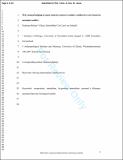Why mutual helping in most natural systems is neither conflict-free nor based on maximal conflict
Abstract
Mutual helping for direct benefits can be explained by various game theoretical models, which differ mainly in terms of the underlying conflict of interest between two partners. Conflict is minimal if helping is self-serving and the partner benefits as a by-product. In contrast, conflict is maximal if partners are in a prisoner’s dilemma with both having the payoff-dominant option of not returning the other’s investment. Here, we provide evolutionary and ecological arguments for why these two extremes are often unstable under natural conditions and propose that interactions with intermediate levels of conflict are frequent evolutionary endpoints. We argue that by product helping is prone to becoming an asymmetric investment game since even small variation in by-product benefits will lead to the evolution of partner choice, leading to investments and partner monitoring. Second, iterated prisoner’s dilemmas tend to take place in stable social groups where the fitness of partners is interdependent, to the effect that a certain level of helping is self-serving. In sum, intermediate levels of mutual helping are expected in nature, while efficient partner control mechanisms may allow reaching higher levels.
Citation
Bshary , R , Zuberbuhler , K & van Schaik , C 2016 , ' Why mutual helping in most natural systems is neither conflict-free nor based on maximal conflict ' , Philosophical Transactions of the Royal Society. B, Biological Sciences , vol. 371 , no. 1687 , 20150091 . https://doi.org/10.1098/rstb.2015.0091
Publication
Philosophical Transactions of the Royal Society. B, Biological Sciences
Status
Peer reviewed
ISSN
0962-8436Type
Journal article
Description
Funding: All authors are funded by individual grants from the Swiss Science Foundation.Collections
Items in the St Andrews Research Repository are protected by copyright, with all rights reserved, unless otherwise indicated.

